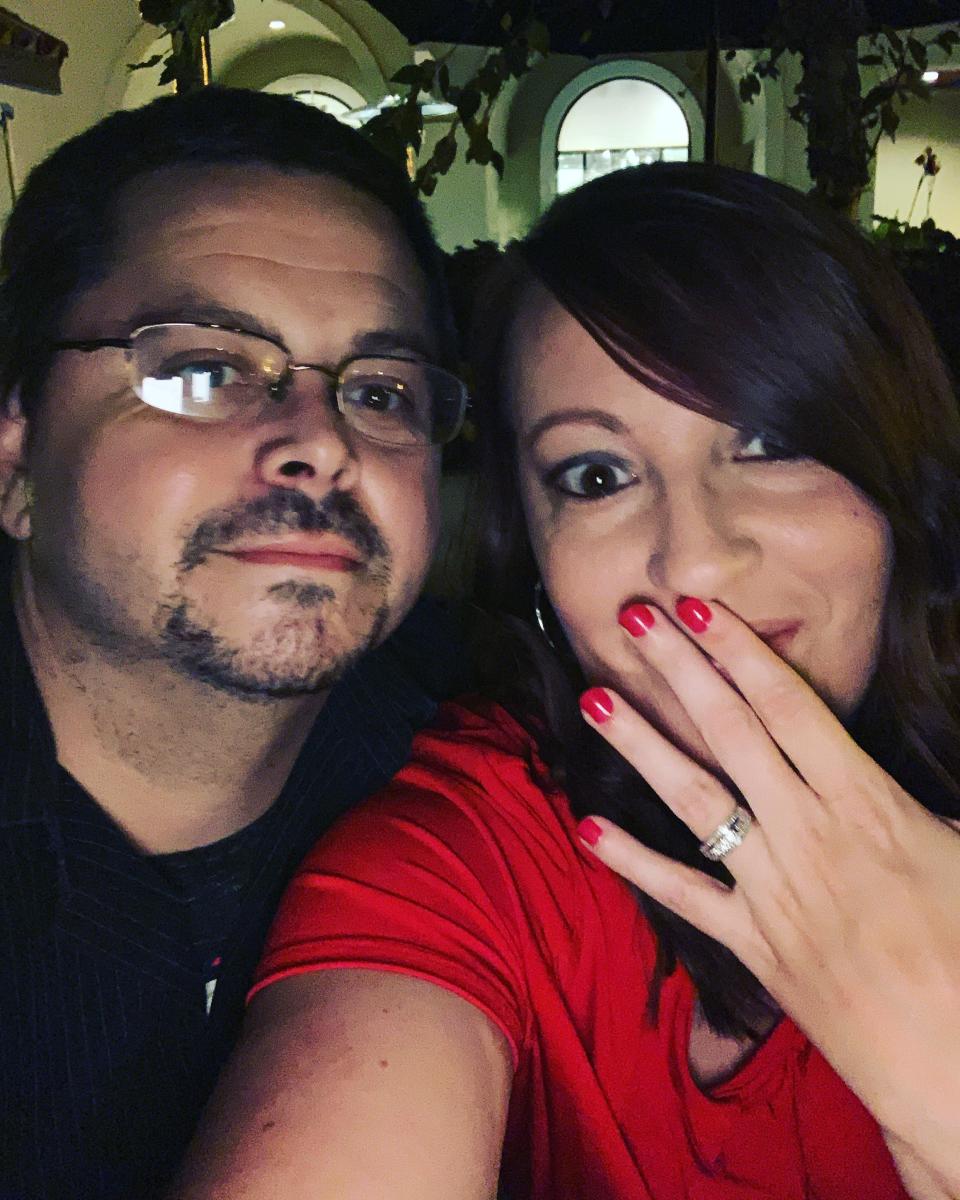Woman who couldn't have sex for 12 years shares her story to raise awareness of vaginismus
Watch: Woman living with vaginismus shares story to raise awareness of the condition.
A bride-to-be who has a condition that means she finds sex excruciatingly painful, has spoken of her determination to consummate her marriage after leaving a 12-year sex-less relationship.
Kendra Blair, 39, wants to raise awareness of vaginismus in order to help other women experiencing the debilitating condition.
She runs a Facebook support group, connecting with other vaginismus sufferers from around the world.
“It’s been such a relief to find women who understand vaginismus,” she said. “Lots don’t speak out as they feel so ashamed, but I’m determined to change that.
“Although I have been struggling recently, I don’t want my story to scare anyone. I want it to be a story of hope.
“Like any long-term condition, dealing with vaginismus is a process – but the important thing is to keep going and not give up.”

Blair always wanted to wait until she was married before having sex for the first time.
Then, at 19, she tied the knot with her first husband and immediately discovered she couldn’t have sex without suffering excruciating pain.
Blair, an insurance worker, from Missouri, US, was diagnosed with vaginismus, a condition where the muscles involuntarily tighten as penetration is attempted.
When the relationship ended after 12 years, Blair went on to meet Sean Rice, 38, in May 2019.
Now engaged for the second time, Blair is hoping she will be able to be intimate with her husband when they get married in 2022.
Read more: Vaginisimus: the little-known condition making sex painful
“I have only been able to have penetrative sex with Sean a couple of times in our entire time together,” she said.
“Of course, there are other things we can do, but there are times when I feel very depressed and wonder how long he’ll stay with me, or what he’s getting out of the relationship.
“But he does everything he can to reassure me and by proposing, I know he’s in it for the long haul. I feel very lucky to have met him.”
Read more: Durex is right – why is sex painful for so many women?
When Blair was unable to have sex on her first wedding night 20 years ago, she simply put it down to nerves.
But in the months that followed, she experienced an extreme burning sensation and became so distressed that she would hyperventilate every time she attempted to have sex with her husband.
“It felt like there was a bone there that my husband couldn’t get through,” she explained. “My then-husband and I endured months of frustration. I knew there was something else wrong, but everyone just kept telling me to relax.”
Eventually, Blair consulted a gynaecologist and she experienced a similar extreme reaction when the doctor attempted to conduct an internal examination.
“My automatic reaction was to hyperventilate, close my legs, squirm to get away and push the doctor away saying, ‘Don’t touch me,’” she explained.
It was five years before Blair found enough courage to see a second doctor, who diagnosed her with vaginismus.
“I felt some relief when the doctor told me what I had, as it proved I wasn’t crazy,” she said.

Blair was given dilators, instruments designed to stretch and retrain the vaginal muscles, but they did not work.
“I couldn’t get any of them in – not even the smallest one, which was the size of a small tampon. I just couldn’t do it. It was too painful,” she said.
Starting to lose hope of ever finding a solution to her problem, Blair’s marriage began to suffer, and in 2012, after 12 years without sex, her relationship ended.
“Before we split, I’d tell my husband to go and have sex with someone else,” she said. “I didn’t want that, but I felt so frustrated.
“It didn’t help that I was getting older and people were always asking why we didn’t have kids yet.
“I’ve always wanted to be a mother, but the vaginismus was preventing me from getting pregnant.”
Though Blair says there were additional issues, which contributed to the breakdown of the marriage, she believes her vaginismus was a factor.
“After a while, I’d stopped wanting to work on it because I knew it was going to hurt,” she said.
After her divorce, Blair’s confidence was in shreds and when she finally felt ready to date again, she worried what men would think when they learnt she could not have sex.
Read more: One in 10 people in UK have not had sex since lockdown first began in March

But then she met Rice online and his support has been unwavering.
“I told him early on by text, ‘I have a condition that makes sex painful and so far, I haven’t been able to have it,’” she said.
“I explained it could be really frustrating and exhausting, and that it wasn’t that I didn’t want to have sex – I just couldn’t.
“He was amazing and told me he wasn’t in it for the sex. He really put my mind at ease.”
At the same time Blair started seeing a physical therapist and performing pelvic floor exercises to stretch her muscles.
She also joined a Facebook support group for women living with vaginismus, and buoyed by their support, her self-esteem returned.
The physical therapy also helped her to be able to have sex with Rice on a couple of occasions.
“I didn’t feel as broken,” she said.
But since the beginning of this year, Blair says her symptoms have regressed, something she puts down to the stress of the coronavirus pandemic.
“I’ve backtracked a lot, meaning Sean and I haven’t been able to sleep together for a long time,” she said.
“When lockdown hit, a lot of doctors’ offices closed and treatments were put on pause, so I couldn’t have my physical therapy as usual. Plus, stress can be a real trigger.”
Although Rice was incredibly reassuring, Blair could not help worrying about the implications for their relationship, if she was unable to have sex with him anymore.
But, at the beginning of September, he surprised her with a proposal.
“We’d spoken about marriage, so I knew it was something we both wanted, but I had no idea he’d gone and got a ring,” she said.
“He knows I don’t like being the centre of attention and wouldn’t have wanted a really public proposal, so he ended up asking me at home.”
Watch: Love Island star says she’s never experienced an orgasm.
Though they are still in the early stages of planning their big day, the couple hope to have an outdoor ceremony in 2022.
Blair has recently resumed doing her stretches and exercises, and hopes this means she will be able to consummate her marriage.
She has also started to see a therapist to help her deal with the emotional fallout of living with vaginismus.
“Sean and I would also like a child together one day, though we don’t know whether that will be possible,” she said. “Only time will tell.”
Read more: Love Honey has launched a sex toy advent calendar

What is vaginismus?
According to the NHS, vaginismus is the body’s automatic reaction to the fear of some or all types of vaginal penetration.
Whenever penetration is attempted, the vaginal muscles tighten up.
Common signs of vaginismus, which is said to affect two in 1000 women in the UK, include finding it hard to insert a tampon into your vagina, struggling with vaginal penetration during sex and feeling a burning or stinging pain during sex.
Treatment for vaginismus usually involves managing feelings around penetration and exercises to gradually get you used to penetration.
The NHS says that there is often no obvious explanation about what causes vaginismus, but have listed some potential triggers including:
fear that your vagina is too small
a bad first sexual experience
an unpleasant medical examination
a belief that sex is shameful or wrong
a painful medical condition, like thrush
If you think you may be suffering from vaginismus see your doctor.
Additional reporting PA Real Life.

 Yahoo News
Yahoo News 


